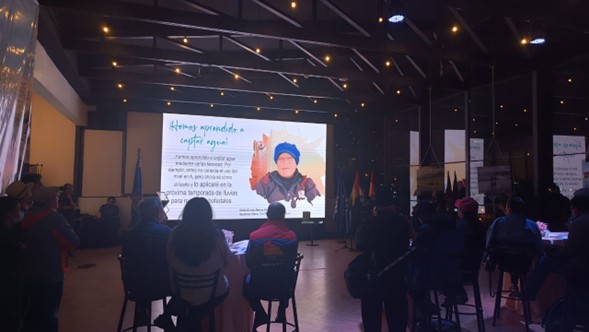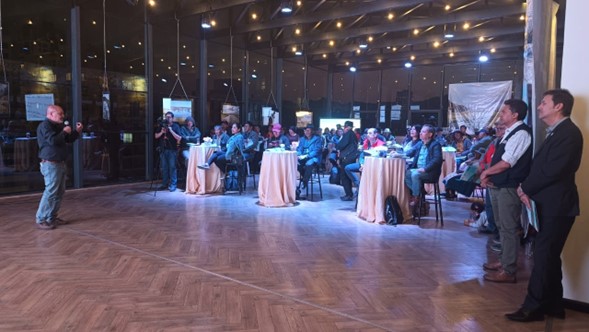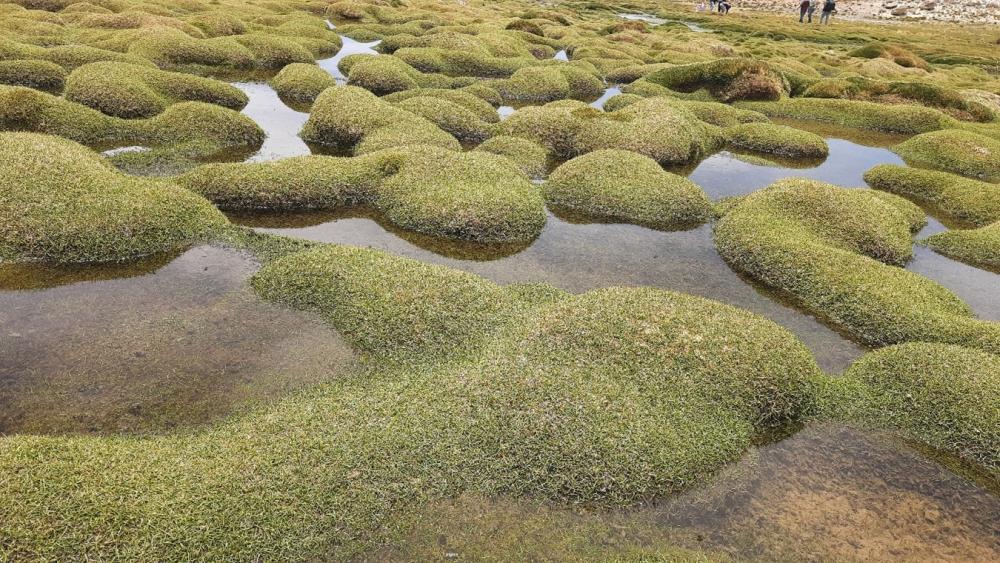The initiative promotes sustainable practices to preserve vulnerable ecosystems and enhance the resilience of high Andean communities and camelid livestock in the face of climate change

La Paz, 4 October 2024 (IICA). The “Bofedal es Vida” Program is making a significant difference in the conservation and sustainable management of wetlands in Bolivia. These ecosystems are crucial for the environment and the economy of the high Andean communities due to their close connection with camelid activities, but they are under threat due to the effects of climate change.
The “Bofedal es Vida” Program is executed by the Inter-American Institute for Cooperation on Agriculture (IICA) in Bolivia and funded by the European Union through the Euroclima Program, which is implemented by the Spanish Agency for International Development Cooperation (AECID).
“Bofedal es Vida” is being implemented in eight municipalities: Achacachi, Batallas, and Pucarani in La Paz; Pampa Aullagas, Santiago de Andamarca, and Belén de Andamarca in Oruro; and San Pablo de Lípez and San Antonio de Esmoruco in Potosí. The program has focused its efforts on characterizing these ecosystems, and evaluating productive, social, and market aspects related to camelid livestock, which has enabled the design and implementation of climate-smart management plans adapted to each community.
Federico Ganduglia, IICA Representative in Bolivia, emphasized the importance of joint work and its impact on the communities during the presentation of the program’s results: “This has brought about changes in the lives of many people. It’s a before and after. Wetlands are highly important from a sociocultural, socioeconomic, environmental, and geopolitical perspective. They are extremely vulnerable to the climate crisis, which is increasingly affecting all of us. For IICA’s cooperation agenda in Bolivia, these projects also represent a change and a commitment to sustainability. We are developing a series of actions that will allow us to consolidate and scale up the initiatives we are undertaking, leveraging all the work and learning gained since these projects were implemented.”
“This project has had a profound impact on all of us. It has been a response to the needs of vulnerable regions and an example of how cooperation and commitment can transform realities. We know it is not an easy path. We are facing migration, extreme climatic conditions, and a lack of information about these unique ecosystems, but each challenge has been an opportunity to prove that we can achieve a lot when we work together. The success stories presented to us today are the result of your efforts,” said Saraí Suárez, Head of Ecological Transition Projects at AECID in Bolivia, during the event.
Implementation of sustainable practices
Producers have played a crucial role in the program’s implementation, combining ancestral and technical-scientific knowledge. “I am grateful for all the practices we have learned. They are very important, and now we will apply them and teach our children this invaluable knowledge,” commented Delia Berna, a producer from the Quetena Chico community.
The program has promoted a series of sustainable practices that are transforming the way wetlands are managed. In terms of water management, lay-flat systems have been implemented to efficiently transport and irrigate plots to improve water resource management in wetland areas.
For pasture recovery, with the installation of demonstration plots, producers can improve the forage value, which is essential for feeding llamas, alpacas, and other animals. Techniques such as retepeo and medias lunas have also been applied to harvest water and regenerate pastures in degraded areas.
To improve camelid livestock health and nutrition, accessible and low-cost practices, such as the treatment of hay and the production of nutritional blocks, are being used, especially during winter months when pasture availability is limited.
lidar y escalar las iniciativas que estamos llevando adelante, aprovechando todo este trabajo y el aprendizaje adquirido desde la implementación de estos proyectos”.

Additionally, as part of the development of value propositions for llama meat and fiber, five communities have signed a letter of interest to deliver three tons of fiber to a Bolivian company.
Angélica Ponce, Executive Director of the Plurinational Authority of Mother Earth (APMT), under the Ministry of Environment and Water (MMAyA), noted: “We already knew about these practices from many years ago, from our ancestors, but we had forgotten them. These projects are important for adapting to and mitigating climate change. Wetlands are systems of life, not just for feeding; they help the environment and reduce carbon emissions.”
Impact on high Andean communities
To date, the “Bofedal es Vida” program has trained more than 1,400 producers in sustainable management of soil, pastures, water, and camelid livestock, with significant participation from women, who represent approximately 42% of the beneficiaries. This inclusive approach is strengthening the empowerment and resilience of local communities in the face of climate change challenges, contributing to the economic and social sustainability of the high Andean regions.
Prudencio Flores, from the Litoral community, one of the eldest individuals involved in the program, highlighted the technical documentation provided to each community: “It is important to leave this for our children. Before, knowledge was passed down verbally, but now it is professional. They are leaving written records, and our children will not forget how to conserve the pastures and our wetlands.”
In this regard, the mayor of Belén de Andamarca, Óscar Anagua, highlighted the joint work and the achievements made: “I am grateful for the management of the wetlands because we feel that it is one of the main sources for our department and for the Plurinational State of Bolivia. Taking care of camelids, which are the foundation of our economy in the Bolivian highlands, is essential. One stage is ending, but we hope this will continue for the sake of our producer families.”

Commitment to the future
The work of the “Bofedal es Vida” project demonstrates a commitment to the conservation and sustainable management of wetlands, which are essential in facing the challenges of climate change. By empowering Andean communities and promoting sustainable practices, the project not only protects a vital ecosystem but also ensures a more resilient and prosperous future for generations to come.
The “Bofedal es Vida” Project:
– Geographic reach: 14 communities in eight municipalities in La Paz, Oruro, and Potosí.
– 18 wetlands were monitored and characterized: nine in Potosí, four in Oruro, and five in La Paz, covering an area of 2,872 hectares.
– Climate-smart management plans were developed for the eight municipalities, and based on these, practices were prioritized with producers for each wetland. Four water, pasture, and soil management practices and three camelid livestock health and nutrition practices were implemented in total.
– Eight value propositions were developed with producers for llama meat and fiber.
– Participants in training sessions: 1,476 producers.
– Local and national technical professionals who participated in training workshops: 239.
About Euroclima
Euroclima is a program funded by the European Union and co-financed by the German federal government through the Federal Ministry for Economic Cooperation and Development (BMZ), as well as the governments of France and Spain through the Ministry of Foreign Affairs, European Union, and Cooperation.
The program’s mission is to reduce the impact of climate change and its effects in 33 Latin American and Caribbean countries, promoting mitigation, adaptation, resilience, climate investment, and biodiversity. It is implemented under the “Team Europe Spirit” through the synergistic work of seven agencies: Spanish Agency for International Development Cooperation (AECID), AFD Group: French Development Agency (AFD)/ Expertise France (EF), Economic Commission for Latin America and the Caribbean (ECLAC), International and Ibero-American Foundation for Administration and Public Policies (FIIAPP), Deutsche Gesellschaft für Internationale Zusammenarbeit (GIZ) GmbH, the United Nations Environment Programme (UNEP), and the United Nations Development Programme (UNDP).
For more information:
federico.ganduglia@iica.int











